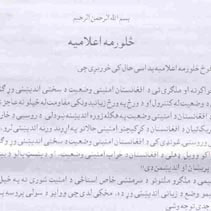|
Some 60 U.S Soldiers Killed in Afghanistan: Statement
 |
|
A
statement written in Pashtun said 60 Am,erican soldiers were
killed till February
|
By
Nadim Shaker, IOL Kabul correspondent
KABUL,
February 18 (IslamOnline.net) – The Secret Army for Islamic
Mujjahiddin in Afghanistan said on Monday, February 17, that more than
60 American soldiers were killed and hundreds injured in attacks on
U.S. Special forces and the International Security Assistance Force
(ISAF) during the period between December 22 and February 4.
In
a statement faxed to IslamOnline in Pashtun, the number of
operations against foreign forces at the period hit 37, including
killing nine American soldiers and wounding 48 others in three-day
clashes in Kandahar late on January. It added that American forces
claimed that Afghan resistance fighters all perished after the
clashes.
The
statement went into details regarding the attacks launched against
American targets in the country, stopping short of determining the
groups that carried out the operations.
Questioning
assurances that the American Special Forces restored security to the
war-torn country, the Secret Army claimed that four U.S. aircrafts
were downed on from December 22 to February 4, one in Afghan capital
Kabul that left all of its seven crew dead and another spy drone that
shot down near the borders with Pakistan.
It
added that the third was a helicopter plane that was brought down in
clashes with Afghan forces in Kandahar and the fourth between Kabul
and Bagram in a missile attack.
The
operations raised concerns of the American forces in Afghanistan,
British forces and United Nations officials, with the U.S. readying
itself for a potential military action against Iraq, read the
statement.
It
quoted Lt. Gen. Daniel K. McNeill, who commands U.S. forces in the
country, as saying in press statements on Wednesday, February 5, that
the U.S. military operations against Iraq would leave the security
situation in Afghanistan shaken and “out of our hands”. He warned
of further attacks on American and coalition forces in the event of
war against Iraq.
McNeill
said late in January that he expected 8,000 U.S. troops to remain in
Afghanistan for another 18 months to two years before being gradually
decreased.
 |
|
Attacks
against U.S. Special Forces noticeably increased
|
Mcneil
met on Monday with Afghan President Hamid Karzai to discuss a
coalition assault last week that left several civilians dead,
including a boy.
A
U.S. report said last month that American forces in Afghanistan still
face an invisible but determined enemy, fifteen months after the
start of their campaign to topple the Taliban and wipe out Al Qaeda.
The
deteriorating security situation led U.S. President George W. Bush to
phone Afghan President Karzai and assured him that the U.S. stance on
Afghanistan would not be changed.
The
U.N envoy to Afghanistan also warned in an address to the Security
Council that security situation in some of the country is
gravely escalating and demanded a serious international interference
before all plans for settlement and reconciliation in the country
prove a failure, read the Secret Army’s statement.
It
added that attacks against international forces expanded to northern
and southwestern Afghanistan, including several missile operations
against the Bagram Air Base.
Two
Afghan groups issued
statements in January, vowing to carry out martyr operations
against American forces in the southern east provinces of Afghanistan.
Citing that the two groups are unknown, some observers said the
announcement was part of a psychological war against the American
military presence in Afghanistan.
U.S.
Special Forces Ambushed
In
another related development, U.S. Special Forces in eastern
Afghanistan have been ambushed by unknown attackers, as an ongoing
offensive in the center of the country was halted by heavy snow,
reported Agence France-Presse (AFP).
A
military spokesman said Tuesday, February 18, that a routine patrol
near Asadabad, the provincial capital of Kunar province, came under
automatic weapons fire Monday, but there was no damage.
Describing
the attack as "ineffectual" he said the assailants were too
distant for the patrol to locate and return fire.
"The
patrol had two choices, they could stop and fight or get out of the
area. They got out of the area."
Kunar,
close to the mountainous border with Pakistan, has previously been a
hotbed of activity for extremists loyal to the former Taliban regime
or the al-Qaeda network blamed for the September 2001 attacks on the
United States.
|